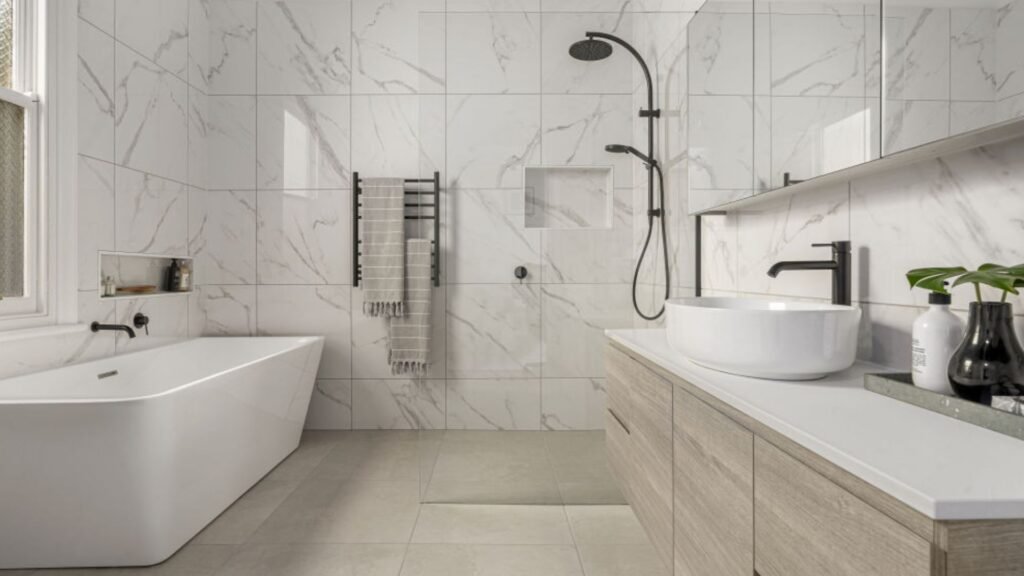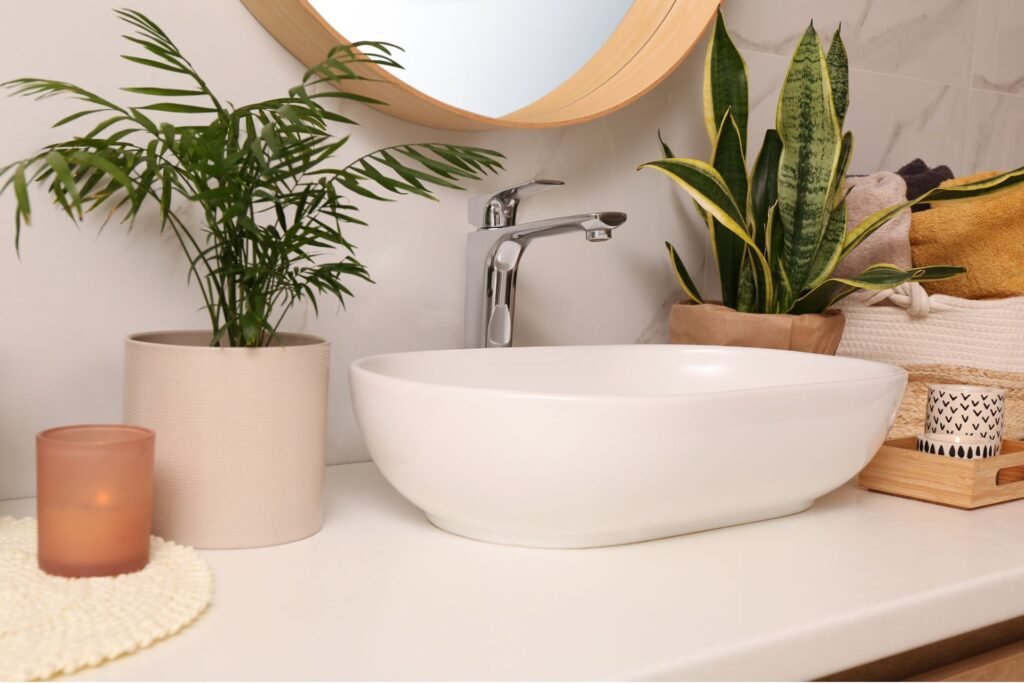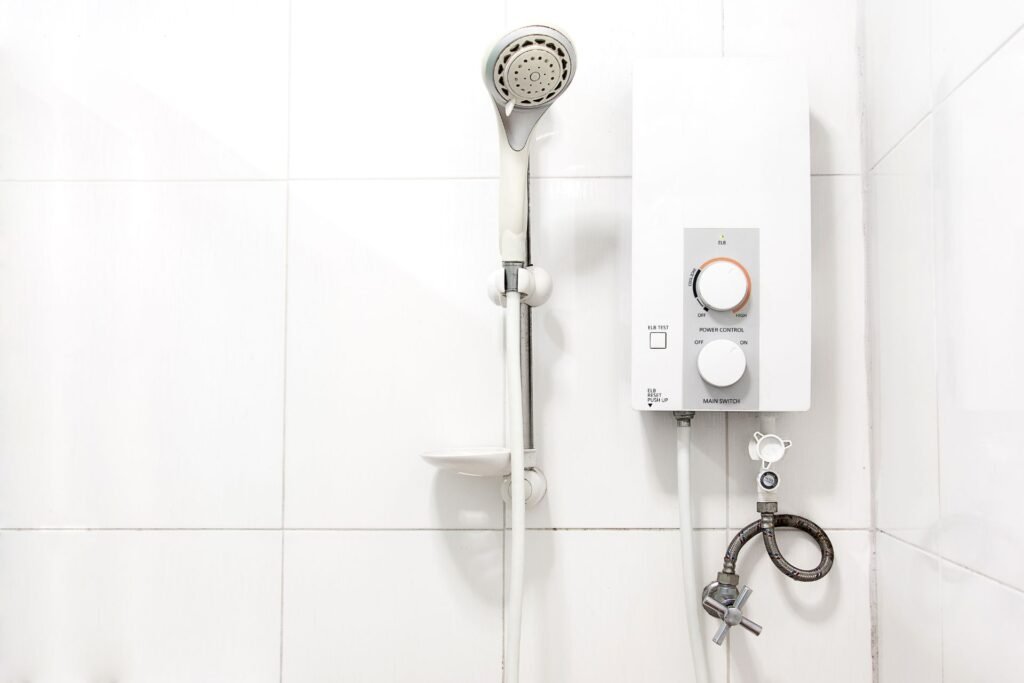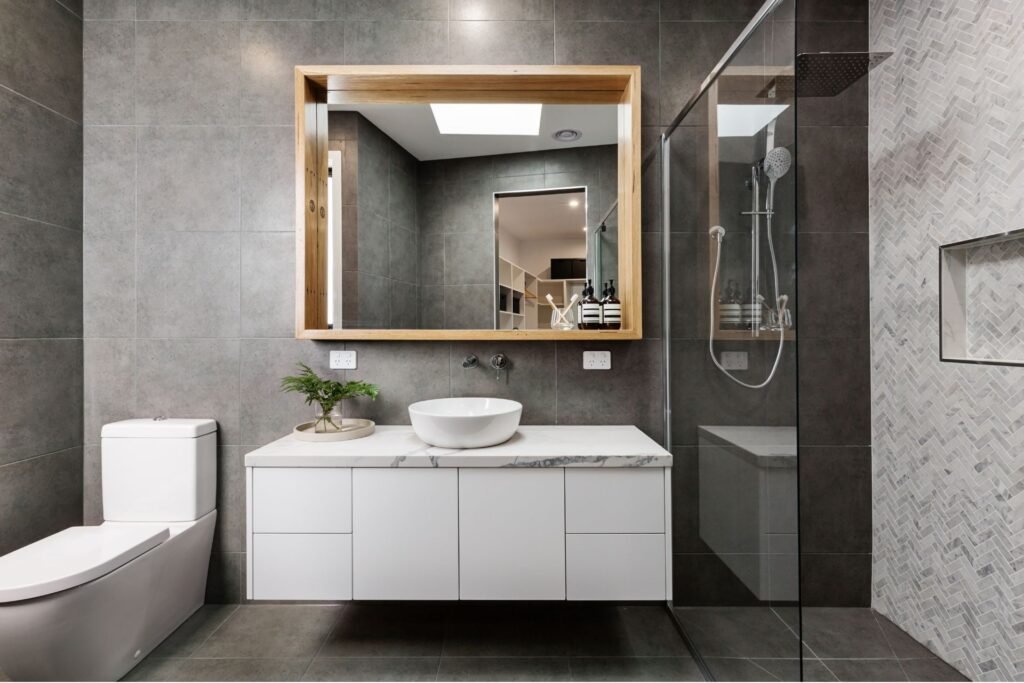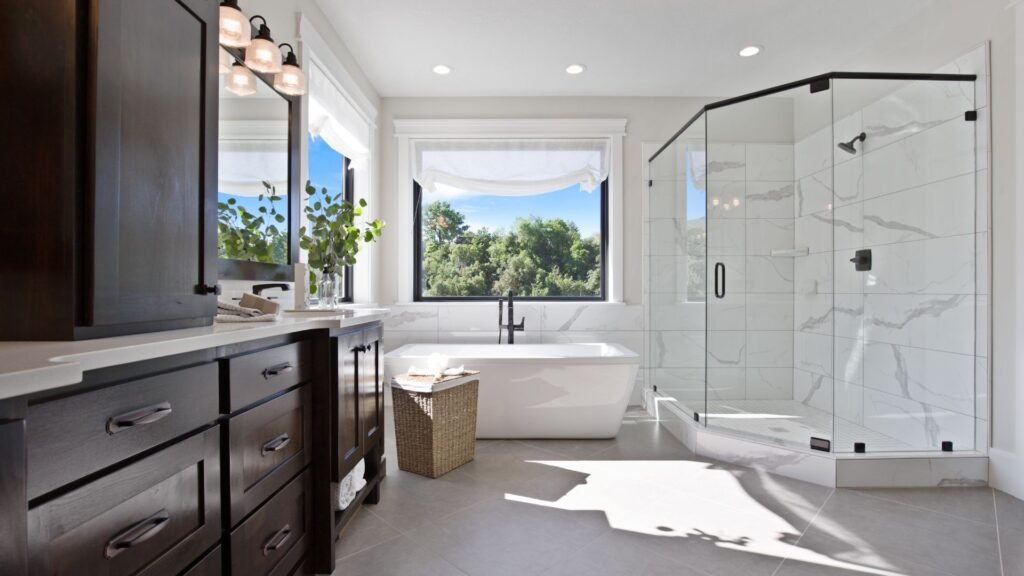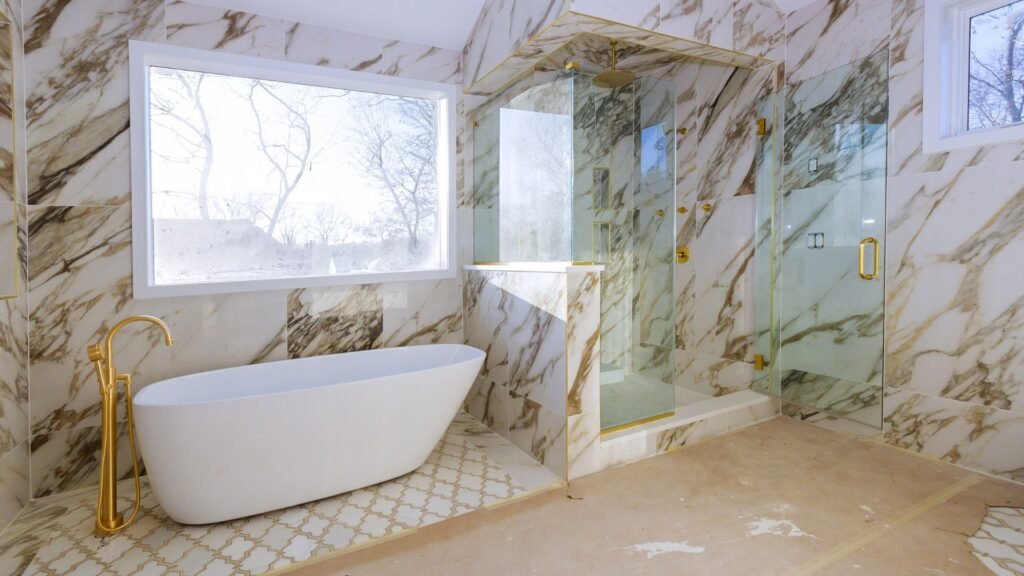Welcome to your ultimate guide to the cost of bathroom renovations in NZ! Renovating your bathroom is one of the most rewarding home improvement projects you can undertake, but it can also be a significant investment. Whether you’re looking for a budget-friendly makeover or a luxury transformation, understanding the various factors that influence costs—from materials and labor to hidden expenses like permits and compliance—is essential. In this blog, we’ll explore everything you need to know about budgeting for your bathroom renovation, providing you with a clear picture of what to expect, so you can plan and execute your dream bathroom with confidence.
On average, the cost of bathroom renovations in NZ ranges from $5,000 to over $30,000, depending on the size, materials, and scope of the project. Budget renovations typically fall between $5,000 and $15,000, mid-range renovations cost around $15,000 to $30,000, and high-end renovations can exceed $30,000. Factors like labor, permits, and unforeseen repairs may also impact the final cost.
- Factors Influencing The Cost Of Bathroom Renovations In NZ
- Typical Cost Breakdown Of Bathroom Renovations In NZ
- Cost-Saving Tips For Bathroom Renovations
- Financing Your Bathroom Renovation
- Examples Of Bathroom Renovation Costs Across NZ
- Trends In Bathroom Renovations In NZ
- FAQs: About Cost Of Bathroom Renovations NZ
- What is the average cost of a bathroom renovation in New Zealand?
- What factors influence the cost of a bathroom renovation in NZ?
- Is it cheaper to renovate a bathroom in rural areas of NZ compared to cities like Auckland or Wellington?
- What is the cost breakdown for a budget, mid-range, and high-end bathroom renovation in NZ?
- Can I save money by doing some of the bathroom renovation work myself?
- What permits are required for a bathroom renovation in New Zealand, and how much do they cost?
- Are there any financing options available for bathroom renovations in NZ?
- What are some ways to reduce the cost of a bathroom renovation in NZ?
- How long does a typical bathroom renovation take in NZ?
- What are the most popular bathroom renovation trends in New Zealand right now?
- Conclusion
Factors Influencing The Cost Of Bathroom Renovations In NZ
When considering a bathroom renovation in New Zealand, various factors come into play that can significantly impact the final cost. Whether you’re planning a minor update or a complete overhaul, understanding these elements will help you manage your budget more effectively and avoid any unpleasant surprises.
Size and Scope of the Renovation
The overall size of your bathroom and the scope of the renovation are two major determinants of cost. A small bathroom remodel typically costs less than a larger one simply because there is less space to cover in terms of materials and labor. However, don’t let size alone dictate your budget. The extent of the renovation also plays a crucial role.
For instance, a full renovation, where everything from the flooring to the fixtures is replaced, will naturally cost more than a partial update that focuses on refreshing specific elements such as replacing the vanity, shower, or tiles. Layout changes that involve plumbing and electrical work are also more expensive, as they require skilled labor and compliance with regulations.
Materials and Finishes
Your choice of materials and finishes can significantly affect the overall cost of your bathroom renovation. Generally, materials fall into three categories: low-end, mid-range, and high-end options. Low-end materials such as basic ceramic tiles and prefabricated vanities are more affordable, but they may lack the durability or aesthetic appeal that you’re seeking.
On the other hand, mid-range and high-end materials like porcelain tiles, luxury stone countertops, and custom-made showers can quickly elevate both the look of your bathroom and the renovation cost. The availability of materials in NZ is another critical factor. Some premium finishes might need to be imported, which not only increases the price but can also extend the project timeline.
Labor Costs
Labor costs are a substantial part of your renovation budget, and they can vary depending on the scope of work and your location in New Zealand. The labor involved in a bathroom renovation typically includes plumbers, electricians, tilers, and carpenters, each with their own rates. For instance, plumbers and electricians tend to charge more due to the specialized nature of their work and the safety standards they must adhere to.
Regional differences also play a part. In places like Auckland, where the demand for tradespeople is high, labor costs can be significantly steeper than in other parts of the country, such as Christchurch. It’s essential to get quotes from multiple professionals to ensure you are getting a fair price for the work involved.
Permits and Compliance
When renovating your bathroom in New Zealand, you must ensure that your project complies with local building codes and regulations. In some cases, especially for extensive remodels or structural changes, you may need to obtain permits from your local council. These permit costs vary depending on the scope of the renovation and the region you’re in.
Moreover, renovations need to meet NZ-specific compliance standards, especially when it comes to plumbing and electrical work. Ensuring compliance may involve additional costs for inspections and certifications, but it is crucial to avoid future legal issues and to guarantee that your new bathroom is safe and up to code.
Hidden Costs
Hidden costs can quickly add up during a bathroom renovation, making it vital to budget for them from the outset. Common unexpected expenses include discovering water damage, mold, or rot behind walls once the old fixtures and tiles are removed. Repairing this damage can add hundreds, if not thousands, to your budget.
Upgrading outdated systems can also be a costly surprise. For example, older homes may have outdated plumbing or electrical systems that need to be brought up to code during the renovation. While these upgrades may be an additional expense, they are essential for the long-term safety and functionality of your home.

Typical Cost Breakdown Of Bathroom Renovations In NZ
Renovating a bathroom is a significant project that can greatly improve the comfort, aesthetic appeal, and value of your home. However, the costs involved in bathroom renovations vary widely based on the scale and quality of the work. Here’s a detailed breakdown of the typical costs associated with bathroom renovations in New Zealand, so you can plan your budget accordingly. Whether you’re looking for a basic refresh or a luxurious upgrade, understanding these ranges will help you make informed decisions.
Basic/Budget Bathroom Renovation
If you’re working with a tighter budget, a basic bathroom renovation in New Zealand generally falls within the $5,000 to $15,000 range. This level of renovation typically focuses on essential updates rather than dramatic transformations.
For a basic renovation, you can expect to focus on simple yet functional upgrades. Standard fixtures such as a basic toilet, an off-the-shelf vanity, a modest shower unit, and inexpensive tiles or vinyl flooring are common in this price bracket. The materials used tend to be durable but cost-effective. You might consider retaining the existing plumbing layout to avoid the expense of moving pipes and drains.
Even though budget renovations are more conservative, they can still breathe new life into a bathroom. For example, replacing outdated fittings with modern yet affordable alternatives, adding a fresh coat of paint, or updating your lighting fixtures can make a significant impact. Budget-conscious renovators often opt for DIY installations where possible, though professional assistance may still be required for specific tasks such as plumbing or electrical work.
Mid-Range Bathroom Renovation
For those looking to invest a bit more into their bathroom, a mid-range renovation typically costs between $15,000 and $30,000. With this increased budget, you have more flexibility to create a bathroom that is not only functional but also aesthetically pleasing.
In this price range, you can expect to upgrade to higher-quality materials and fixtures. Common upgrades include semi-custom vanities, higher-end tiles (such as porcelain or ceramic), frameless glass shower doors, and more durable and stylish flooring options. You might also incorporate features like underfloor heating or modern LED lighting that enhance the ambiance of the space.
A mid-range renovation often involves more customization, which can give your bathroom a more polished and cohesive look. For example, you might choose to install a larger vanity with additional storage or upgrade to a more powerful and energy-efficient ventilation system. The design may involve moderate changes to the layout, allowing for a more spacious and comfortable feel without drastically increasing costs.
High-End Bathroom Renovation
For those seeking a luxurious bathroom experience, high-end renovations typically start at $30,000 and can go well beyond that figure, depending on the scope and complexity of the project. High-end renovations focus on creating a space that is both elegant and high-performing, with custom design features and premium finishes.
In a high-end bathroom renovation, the possibilities are almost endless. You might opt for custom cabinetry crafted to your specifications, premium marble or stone countertops, and high-end fixtures such as rainfall showerheads, freestanding bathtubs, and touchless faucets. The flooring could be natural stone or premium tiles, and you may even consider smart bathroom technology, such as digitally controlled showers, heated towel racks, and integrated sound systems.
Additionally, a high-end renovation might involve extensive layout changes, including moving walls or plumbing to create a completely new configuration. This level of customization allows you to design a bathroom that perfectly fits your vision of luxury and relaxation.
Ultimately, the cost of your bathroom renovation in New Zealand will depend on the choices you make regarding materials, fixtures, and design complexity. Whether you’re going for a basic, mid-range, or high-end renovation, careful planning and budgeting will help ensure that you achieve the bathroom of your dreams without overspending.

Cost-Saving Tips For Bathroom Renovations
When planning a bathroom renovation, balancing your budget without compromising on style or quality is essential. With careful planning and smart choices, you can keep your costs down while still achieving a modern and functional space. Here are some tips to help you maximize your renovation budget in New Zealand.
DIY vs. Professional Work
One of the first things to consider when renovating your bathroom is deciding what you can handle on your own and what tasks are best left to the experts. For instance, smaller jobs like painting, installing new hardware, or replacing fixtures like towel racks and mirrors can often be tackled by a confident DIYer. These tasks require basic tools and are generally low-risk in terms of potential mistakes.
However, more complex projects such as plumbing, electrical work, and tiling should be left to professionals. In New Zealand, regulations around building and safety are stringent, especially in wet areas like bathrooms. Attempting major installations or repairs without the necessary qualifications can not only lead to costly errors but may also void your insurance or fail to comply with local building codes. Hiring professionals for these tasks ensures the job is done correctly and saves you from potential headaches down the line.
Reusing or Refurbishing Existing Elements
A great way to reduce costs is to work with what you already have. Instead of replacing everything in your bathroom, consider refurbishing or reusing key elements. For example, bathtubs can often be resurfaced rather than replaced. This involves applying a new coating to the tub, giving it a fresh look at a fraction of the cost of a new unit.
Vanities and cabinets can be similarly updated. Rather than tearing them out and buying new ones, you can refinish or repaint them, perhaps adding new handles or hardware for a modern touch. Even tiles can sometimes be cleaned and re-grouted to restore their original appeal. By working with existing materials, you can significantly cut down on demolition and purchasing costs, which are often two of the biggest expenses in a bathroom renovation.
Shopping Around for Quotes
In New Zealand, prices for materials and labor can vary greatly depending on the supplier and tradesperson you choose. One of the most effective ways to save money is to gather multiple quotes before committing to any contractor or supplier. Don’t settle for the first quote you receive—take the time to compare costs for materials like tiles, fixtures, and fittings across different suppliers.
Similarly, when it comes to tradespeople, getting multiple quotes ensures you’re not overpaying for labor. This also gives you an opportunity to gauge their experience and reliability. When gathering quotes, make sure to ask for a detailed breakdown so you can understand exactly what you’re paying for and where you might be able to cut costs.
Choosing Timeless Designs
While it can be tempting to opt for the latest design trends when renovating your bathroom, doing so can lead to higher costs in the long term. Trends often change quickly, and what’s fashionable today might look dated in just a few years. To avoid costly updates down the line, consider choosing timeless, classic designs that will stand the test of time.
Neutral color schemes, simple fixtures, and clean lines are always in style and can appeal to a wide range of tastes. By focusing on durable, long-lasting materials and avoiding overly trendy elements, you’ll ensure that your bathroom remains fresh and functional for years to come. This approach also increases the value of your home, as potential buyers are more likely to appreciate a classic design than a trend that may have already passed.
In conclusion, saving on bathroom renovations doesn’t mean you have to sacrifice quality or style. By understanding what can be DIYed, reusing existing elements, shopping around for quotes, and opting for timeless designs, you can keep costs down while still creating a beautiful and functional bathroom.

Financing Your Bathroom Renovation
When planning a bathroom renovation, one of the biggest considerations is how to finance it. Whether you’re dreaming of a luxurious upgrade or just need a practical makeover, understanding your financial options is key to making your vision a reality. Let’s explore three primary avenues: saving up, taking out a loan, and tapping into government grants and subsidies available in New Zealand.
Saving Up vs. Taking a Loan
- Saving Up: One of the most financially sound approaches is to save up before embarking on your bathroom renovation. When you pay upfront with savings, you avoid taking on debt and the associated interest payments, which can add up over time. This method gives you full control over your budget, as you’re only spending what you already have. Additionally, saving up gives you more time to carefully plan your renovation, research contractors, and ensure that every dollar goes where it counts.
However, saving up can take time, especially if your renovation goals are ambitious. If your bathroom is in dire need of repair or improvement, waiting until you’ve saved enough might not be feasible.
- Taking a Loan: On the other hand, taking out a loan allows you to get your renovation started immediately, rather than waiting until you’ve accumulated the necessary funds. This can be a great option if you’re facing urgent repairs or if you’ve found a good deal on materials or labor that you want to lock in.
In New Zealand, personal loans for home renovations are common and can be tailored to suit your needs. The major advantage here is the flexibility to spread out your payments over a period of time, often with fixed interest rates, allowing you to manage your cash flow more easily. However, it’s essential to consider the interest rates and fees, which can increase the overall cost of your renovation. Always compare loan options carefully and ensure that you can comfortably meet the repayments without overstretching your finances.
Home Renovation Loans
If you decide to take a loan, several options are available in New Zealand specifically for home renovations. Home improvement loans typically come with competitive interest rates and various repayment terms, making them a suitable choice for many homeowners.
Some of the most popular types of renovation loans include:
1. Personal Loans: These are unsecured loans that allow you to borrow a lump sum to cover your renovation costs. Interest rates can vary depending on your credit score, but they offer the flexibility to pay off the loan over several years.
2. Home Equity Loans: These are secured against the value of your home. If you have substantial equity in your property, this can be a more cost-effective way to borrow, as interest rates are usually lower than those of unsecured loans. However, keep in mind that your home is on the line if you default on the payments.
3. Revolving Credit or Overdraft: This option works like a large credit card, where you can draw from a pre-approved limit as needed. This can be handy for renovations that might see fluctuating costs, but it requires discipline to avoid overspending.
When considering a renovation loan, it’s crucial to look at the interest rates, repayment flexibility, and any hidden fees that could affect the overall cost. Consulting with your bank or a financial advisor can help you identify the most suitable option based on your circumstances.
Government Grants and Subsidies
In New Zealand, there are a few government schemes that could help offset the cost of your bathroom renovation, particularly if your project involves improving energy efficiency or accessibility.
For example, the Warmer Kiwi Homes Programme offers grants for insulation and heating improvements, which might be applicable if you’re planning to make your bathroom more energy-efficient. This can be particularly useful if you’re installing underfloor heating or energy-efficient water heaters.
Another option is the Healthy Homes Initiative, which provides funding for renovations that contribute to healthier living conditions. If your bathroom renovation involves fixing issues like dampness, mold, or poor ventilation, this initiative may offer some financial assistance.
Additionally, if you are a homeowner over 65 or living with a disability, you may be eligible for specific grants or subsidies aimed at making homes safer and more accessible. This could cover modifications like installing grab bars, lowering counters, or widening doorways.
It’s always worth researching current government initiatives or speaking to a renovation specialist who is familiar with the latest grants and subsidies. These programs can significantly reduce your out-of-pocket expenses, making your bathroom renovation more affordable.
By understanding the pros and cons of saving up, taking out a loan, or leveraging government support, you can make informed decisions that align with your financial situation and renovation goals. Whether you’re building a high-end spa bathroom or simply upgrading an outdated space, careful planning of your financing will set the stage for a successful project.

Examples Of Bathroom Renovation Costs Across NZ
When you’re considering a bathroom renovation in New Zealand, it’s important to recognize that costs can vary significantly depending on your location. Factors such as demand, labor costs, material availability, and even regional rebuilding efforts play a major role in determining the final price tag. Here’s a breakdown of what you can expect for bathroom renovation costs across different areas of NZ:
Auckland
Auckland is one of the most expensive cities in New Zealand when it comes to bathroom renovations. The city’s high demand for renovation services drives up labor costs, which are typically higher than in other parts of the country. Aucklanders can expect to pay more due to a combination of demand for skilled tradespeople, the fast-paced property market, and premium material choices. On average, a mid-range bathroom renovation could cost anywhere from $15,000 to $30,000, with high-end projects potentially going beyond that range. Be sure to factor in costs for plumbing upgrades, tile installation, and custom fixtures, which can quickly elevate the total price.
Wellington
In Wellington, bathroom renovation costs tend to be slightly lower than in Auckland but still within a similar range. The cost of materials in Wellington is often comparable to Auckland, but labor tends to be slightly less expensive. Wellington’s competitive property market also encourages homeowners to invest in quality renovations, which could push the costs upward depending on the scope of the project. A typical bathroom renovation in Wellington might range from $12,000 to $28,000. However, factors such as access to older homes, the cost of upgrading outdated plumbing systems, and weatherproofing against Wellington’s unique climate can all influence the final price.
Christchurch
Christchurch, a city still influenced by the rebuilding efforts following the 2011 earthquakes, presents its own set of challenges and costs for bathroom renovations. Due to ongoing construction in many areas, there is still a strong demand for skilled labor, which can drive prices higher than they might otherwise be in a city of Christchurch’s size. Materials can sometimes be more expensive due to shipping costs or the need for specific products that meet earthquake safety standards. Homeowners in Christchurch should budget anywhere between $13,000 to $25,000 for a standard bathroom renovation. However, those seeking to include additional structural improvements or earthquake-proofing features may see higher costs.
Rural Areas
Renovating a bathroom in rural parts of New Zealand can introduce a new set of challenges, primarily around the availability of both materials and skilled labor. In many rural locations, tradespeople may need to travel longer distances, and specialized materials might take longer to source, increasing both timeframes and costs. That being said, if you have local access to materials and tradespeople, you might save on some aspects of the renovation. On average, a rural bathroom renovation might cost anywhere between $10,000 to $20,000, depending on the distance from suppliers and the complexity of the renovation.
Each region presents its own unique costs and challenges, so it’s crucial to plan your renovation based on your specific location. Getting multiple quotes from local contractors and suppliers can help you manage costs and expectations effectively, ensuring your bathroom renovation is completed within budget while meeting your desired quality.

Trends In Bathroom Renovations In NZ
The bathroom has evolved from a purely functional space to a personal oasis of relaxation and luxury. As bathroom renovations continue to grow in popularity across New Zealand, several key trends are shaping the choices homeowners make. These trends not only influence design but also have cost implications that homeowners should be aware of.
Sustainable and Eco-Friendly Materials
As environmental awareness increases, more New Zealanders are seeking sustainable solutions in their home renovations, and the bathroom is no exception. The demand for eco-friendly materials such as recycled tiles, bamboo flooring, and low-flow fixtures is on the rise. These materials help reduce environmental impact by conserving water, reducing energy usage, and minimizing the depletion of natural resources.
The cost implications of incorporating sustainable materials can vary. For instance, while recycled tiles may be more expensive than traditional options, their longevity and unique aesthetic can justify the investment. Low-flow faucets and showerheads often come with a higher initial cost but offer long-term savings through reduced water usage. Overall, choosing eco-friendly options may slightly increase upfront expenses, but the environmental benefits and potential savings in water and energy bills make it a trend worth considering for many Kiwis.
Smart Bathroom Technology
Technology has entered nearly every aspect of our homes, and the bathroom is no exception. Smart bathroom features such as heated floors, touchless faucets, and smart mirrors are becoming highly sought after in modern bathroom renovations across New Zealand.
Heated floors are especially popular in colder climates, offering the luxury of stepping onto a warm surface even on chilly mornings. The installation of underfloor heating can add to renovation costs, but for many, the comfort it provides is well worth the investment. Similarly, touchless faucets not only offer convenience and hygiene but also help reduce water waste, making them a popular choice for eco-conscious homeowners.
Smart mirrors are another trending feature, with capabilities such as defogging, displaying weather updates, or even incorporating LED lighting for makeup applications. While smart technology can elevate the bathroom experience, it comes with a price tag. Homeowners should be prepared to allocate a portion of their budget toward these high-tech upgrades, which typically cost more than traditional fixtures but offer enhanced functionality and style.
Open-Plan Bathrooms
The concept of open-plan or wet-room bathrooms is gaining traction in New Zealand. These designs feature a more fluid layout, often without walls or barriers separating the shower from the rest of the bathroom. This creates a sense of spaciousness and a modern, minimalist aesthetic that appeals to many homeowners.
While open-plan bathrooms can be visually stunning and offer practical advantages like easier accessibility, they may also increase renovation costs due to the need for higher-quality waterproofing and drainage systems. Additionally, some homes may require structural adjustments to accommodate the open-plan design, further adding to the cost.
Despite the potential for higher costs, many New Zealanders find the investment worthwhile. Open-plan bathrooms can enhance the overall value of a home by creating a luxurious, spa-like environment. They also allow for more creative use of space, making them ideal for both small and large bathrooms.

FAQs: About Cost Of Bathroom Renovations NZ
What is the average cost of a bathroom renovation in New Zealand?
On average, bathroom renovations in NZ range from $5,000 for a budget renovation to over $30,000 for high-end upgrades. Mid-range renovations typically fall between $15,000 and $30,000. The final cost depends on factors such as the size of the bathroom, materials, and labor.
What factors influence the cost of a bathroom renovation in NZ?
The key factors include the size and scope of the renovation, materials and finishes selected, labor costs, and any necessary permits and compliance with local regulations. Hidden costs like unexpected repairs (e.g., water damage) may also affect the overall price.
Is it cheaper to renovate a bathroom in rural areas of NZ compared to cities like Auckland or Wellington?
Yes, bathroom renovation costs in rural areas of NZ can be lower than in major cities like Auckland or Wellington due to reduced labor rates and material costs. However, availability of contractors and materials in rural areas can sometimes increase costs.
What is the cost breakdown for a budget, mid-range, and high-end bathroom renovation in NZ?
A budget bathroom renovation typically costs between $5,000 and $15,000, focusing on simple updates with affordable materials. Mid-range renovations, costing $15,000 to $30,000, often include higher-quality finishes and partial reconfigurations. High-end renovations, over $30,000, involve custom work, premium materials, and luxury upgrades.
Can I save money by doing some of the bathroom renovation work myself?
Yes, DIY work can help reduce costs, particularly for tasks like painting or installing fixtures. However, tasks such as plumbing, electrical work, and waterproofing should be left to licensed professionals to ensure compliance with NZ regulations and avoid costly mistakes.
What permits are required for a bathroom renovation in New Zealand, and how much do they cost?
Bathroom renovations that involve structural changes, plumbing, or electrical work typically require building consent. The cost of permits varies by region and the complexity of the project but can range from a few hundred to over a thousand NZD.
Are there any financing options available for bathroom renovations in NZ?
Yes, several financing options are available for bathroom renovations in NZ, including home renovation loans, personal loans, and sometimes government grants for energy-efficient upgrades. It’s essential to explore these options to determine what works best for your budget.
What are some ways to reduce the cost of a bathroom renovation in NZ?
You can reduce costs by choosing affordable materials, reusing or refurbishing existing fixtures, and doing some of the work yourself. Additionally, shopping around for multiple quotes and avoiding trendy designs that may require updates in the future can help keep costs down.
How long does a typical bathroom renovation take in NZ?
A standard bathroom renovation can take anywhere from 2 to 6 weeks, depending on the complexity of the project, availability of materials, and any unforeseen issues that arise during the renovation process.
What are the most popular bathroom renovation trends in New Zealand right now?
Some of the most popular trends include eco-friendly and sustainable materials, smart bathroom technology like heated floors and touchless faucets, and open-plan or wet-room designs. While trendy, these features may come with higher costs, depending on the scope of the project.
Conclusion
When it comes to bathroom renovations in New Zealand, understanding the primary cost factors such as materials, labor, and permits is essential to staying within your budget. Typical renovation costs can range from a few thousand dollars for basic updates to significantly more for luxury upgrades. To avoid any unpleasant surprises, it’s crucial to plan ahead and create a detailed budget that accounts for both expected and unexpected expenses. By taking the time to organize your renovation properly, you’ll be better positioned to manage costs effectively. If you’re ready to take the next step, now is the perfect time to seek professional quotes or consultations tailored to your specific renovation needs. This will help you get a clearer picture of what to expect and ensure a smoother process from start to finish.
About the Author:
Mike Veail is a recognized digital marketing expert with over 6 years of experience in helping tradespeople and small businesses thrive online. A former quantity surveyor, Mike combines deep industry knowledge with hands-on expertise in SEO and Google Ads. His marketing strategies are tailored to the specific needs of the trades sector, helping businesses increase visibility and generate more leads through proven, ethical methods.
Mike has successfully partnered with numerous companies, establishing a track record of delivering measurable results. His work has been featured across various platforms that showcase his expertise in lead generation and online marketing for the trades sector.
Learn more about Mike's experience and services at https://theleadguy.online or follow him on social media:

